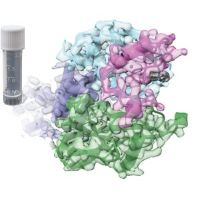Specification
| Description | Recombinant protein from the full-length sequence of homo sapiens protein kinase, cGMP-dependent, type I (PRKG1), transcript variant 2 (NM_006258). |
| Organism | Homo sapiens (Human) |
| Expression Host | Human Cells |
| Tag Info | His or DYKDDDDK. Please contact us if you need further information or require specific designed tag. |
| Purity | Greater than 90% by SDS-PAGE gel |
| Uniprot ID | Q13976 |
| Entry Name | KGP1_HUMAN |
| Gene Names | PRKG1 PRKG1B PRKGR1A PRKGR1B |
| Alternative Gene Names | PRKG1B PRKGR1A PRKGR1B |
| Alternative Protein Names | cGMP-dependent protein kinase 1 (cGK 1) (cGK1) (EC 2.7.11.12) (cGMP-dependent protein kinase I) (cGKI) |
| Application | Antigens, Western, ELISA and other in vitro binding or in vivo functional assays, and protein-protein interaction studies; For research & development use only! |
| Buffer | Purified protein formulated in a sterile solution of PBS buffer, pH7.2, without any preservatives |
| Endotoxin | Endotoxin level is < 0.1 ng/µg of protein (<1EU /µg) |
| Length | 671 |
| Molecular Weight(Da) | 76364 |
| Protein Sequence | (The sequence of expressed protein may have some variation from the sequence shown below. Please contact us for the exact sequence.) MSELEEDFAKILMLKEERIKELEKRLSEKEEEIQELKRKLHKCQSVLPVPSTHIGPRTTRAQGISAEPQTYRSFHDLRQAFRKFTKSERSKDLIKEAILDNDFMKNLELSQIQEIVDCMYPVEYGKDSCIIKEGDVGSLVYVMEDGKVEVTKEGVKLCTMGPGKVFGELAILYNCTRTATVKTLVNVKLWAIDRQCFQTIMMRTGLIKHTEYMEFLKSVPTFQSLPEEILSKLADVLEETHYENGEYIIRQGARGDTFFIISKGTVNVTREDSPSEDPVFLRTLGKGDWFGEKALQGEDVRTANVIAAEAVTCLVIDRDSFKHLIGGLDDVSNKAYEDAEAKAKYEAEAAFFANLKLSDFNIIDTLGVGGFGRVELVQLKSEESKTFAMKILKKRHIVDTRQQEHIRSEKQIMQGAHSDFIVRLYRTFKDSKYLYMLMEACLGGELWTILRDRGSFEDSTTRFYTACVVEAFAYLHSKGIIYRDLKPENLILDHRGYAKLVDFGFAKKIGFGKKTWTFCGTPEYVAPEIILNKGHDISADYWSLGILMYELLTGSPPFSGPDPMKTYNIILRGIDMIEFPKKIAKNAANLIKKLCRDNPSERLGNLKNGVKDIQKHKWFEGFNWEGLRKGTLTPPIIPSVASPTDTSNFDSFPEDNDEPPPDDNSGWDIDF |
Background
| Function | FUNCTION: Serine/threonine protein kinase that acts as key mediator of the nitric oxide (NO)/cGMP signaling pathway. GMP binding activates PRKG1, which phosphorylates serines and threonines on many cellular proteins. Numerous protein targets for PRKG1 phosphorylation are implicated in modulating cellular calcium, but the contribution of each of these targets may vary substantially among cell types. Proteins that are phosphorylated by PRKG1 regulate platelet activation and adhesion, smooth muscle contraction, cardiac function, gene expression, feedback of the NO-signaling pathway, and other processes involved in several aspects of the CNS like axon guidance, hippocampal and cerebellar learning, circadian rhythm and nociception. Smooth muscle relaxation is mediated through lowering of intracellular free calcium, by desensitization of contractile proteins to calcium, and by decrease in the contractile state of smooth muscle or in platelet activation. Regulates intracellular calcium levels via several pathways: phosphorylates IRAG1 and inhibits IP3-induced Ca(2+) release from intracellular stores, phosphorylation of KCNMA1 (BKCa) channels decreases intracellular Ca(2+) levels, which leads to increased opening of this channel. PRKG1 phosphorylates the canonical transient receptor potential channel (TRPC) family which inactivates the associated inward calcium current. Another mode of action of NO/cGMP/PKGI signaling involves PKGI-mediated inactivation of the Ras homolog gene family member A (RhoA). Phosphorylation of RHOA by PRKG1 blocks the action of this protein in myriad processes: regulation of RHOA translocation; decreasing contraction; controlling vesicle trafficking, reduction of myosin light chain phosphorylation resulting in vasorelaxation. Activation of PRKG1 by NO signaling alters also gene expression in a number of tissues. In smooth muscle cells, increased cGMP and PRKG1 activity influence expression of smooth muscle-specific contractile proteins, levels of proteins in the NO/cGMP signaling pathway, down-regulation of the matrix proteins osteopontin and thrombospondin-1 to limit smooth muscle cell migration and phenotype. Regulates vasodilator-stimulated phosphoprotein (VASP) functions in platelets and smooth muscle. {ECO:0000269|PubMed:10567269, ECO:0000269|PubMed:11162591, ECO:0000269|PubMed:11723116, ECO:0000269|PubMed:12082086, ECO:0000269|PubMed:14608379, ECO:0000269|PubMed:15194681, ECO:0000269|PubMed:16990611, ECO:0000269|PubMed:8182057}. |
| Pathway | |
| Protein Families | Protein kinase superfamily, AGC Ser/Thr protein kinase family, cGMP subfamily |
| Tissue Specificity | Primarily expressed in lung and placenta. {ECO:0000269|PubMed:9192852}. |
QC Data
| Note | Please contact us for QC Data |
| Product Image (Reference Only) |  |

